#Joseph Cardinal Ratzinger
Explore tagged Tumblr posts
Text
"What Jesus preaches in the Sermon on the Mount, He now does; He does not offer violence against violence, as He might have done, but puts an end to violence by transforming it into love. The act of killing, of death, is changed into an act of love." -Cardinal Joseph Ratzinger
4 notes
·
View notes
Text
96th Birthday of Late Pope Benedict XVI
This past Sunday, April 16th, would have been the 96th Birthday of the Late Pope Benedict XVI.

Born Joseph Ratzinger, he had a devotion to the church and sereved as professor, Archbishop, Cardinal and later Pope when elected in the Conclave of 2005 after the death of Pope John Paul II.
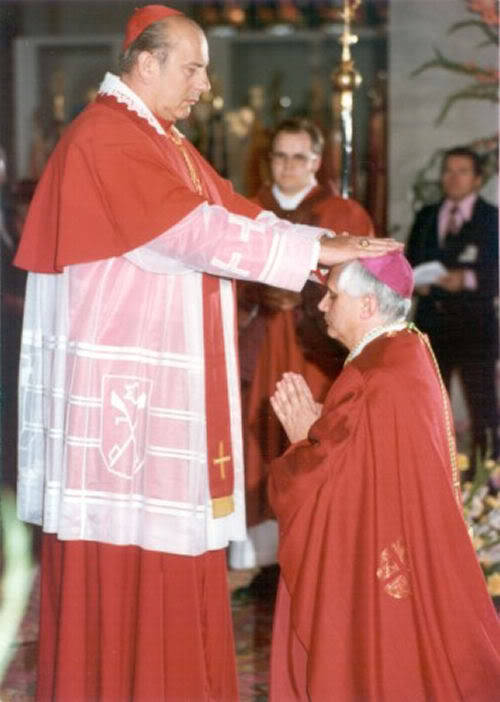
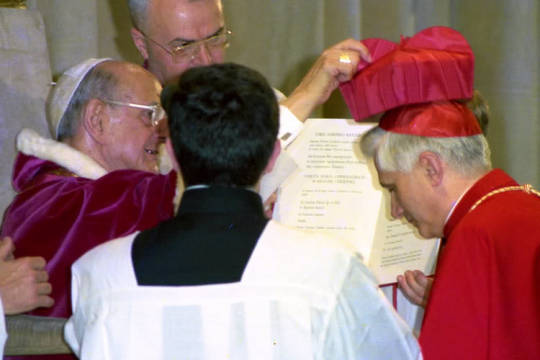

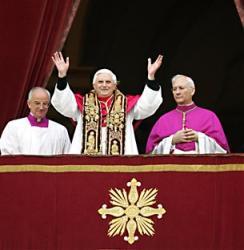
As Pope, Benedict was known for his conseravtive views on matters and adherence to tradition. Yet despite his reputation for being stern, Benedict had a shy persoanlity and was quit gental according to those who knew him best.

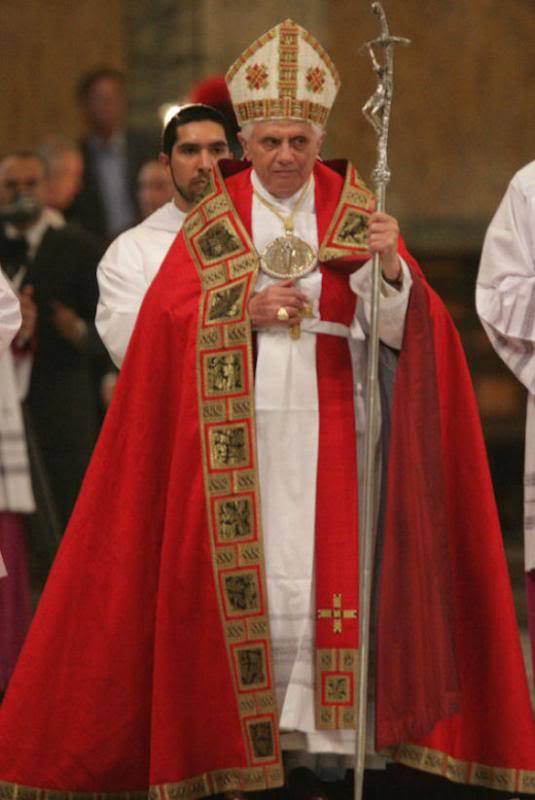
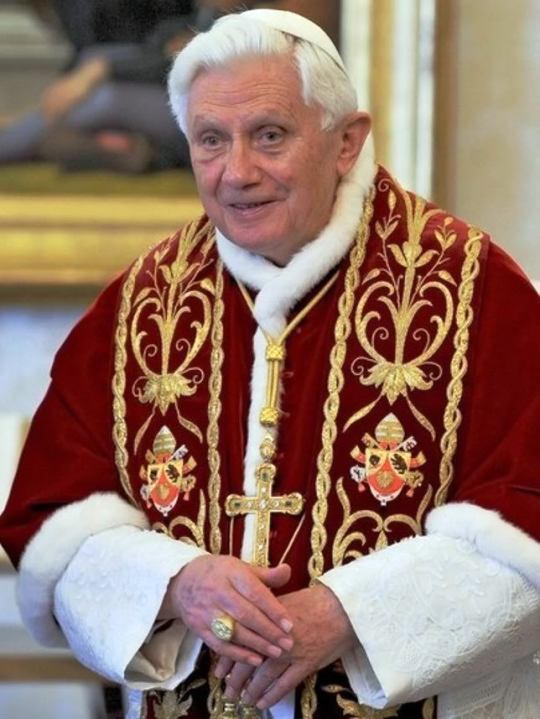
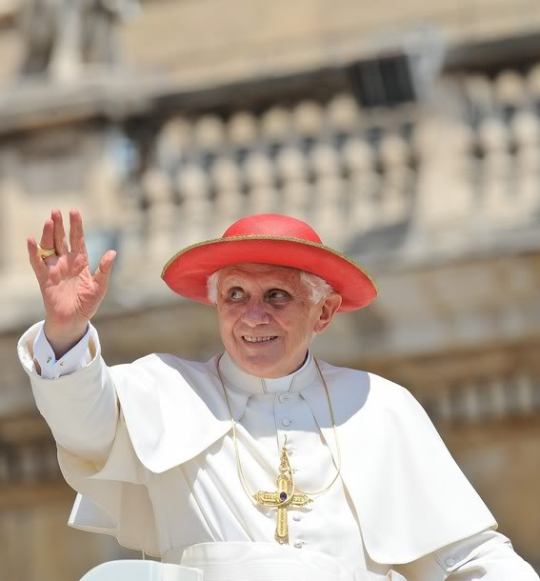


One Febuary 28th, 2013, Benedict resigned from the Papacy, citing his advance age. He was succeded by Pope Francis. Now Pope Emertius, Benedict would continue to live on the grounds of the Vatican in a small former monastary, staying out of the public eye for the most part and leaving only once to visit his aling brother.
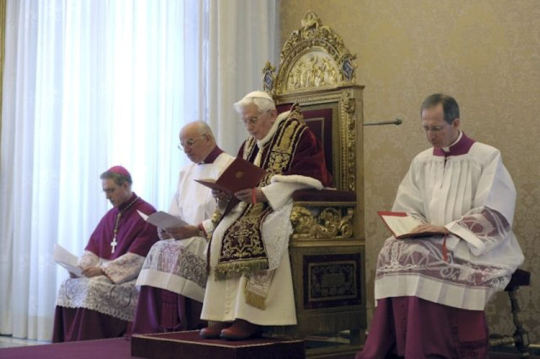

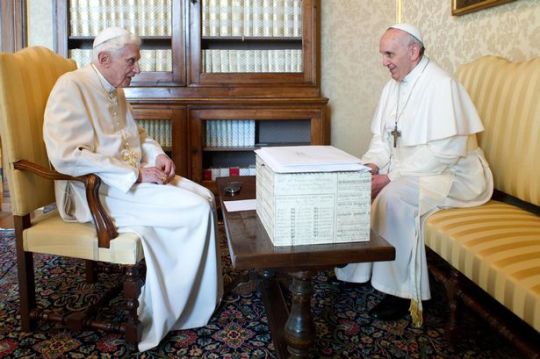

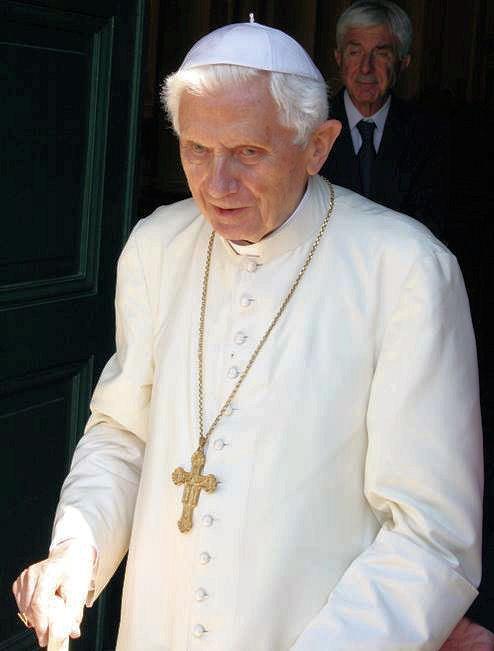
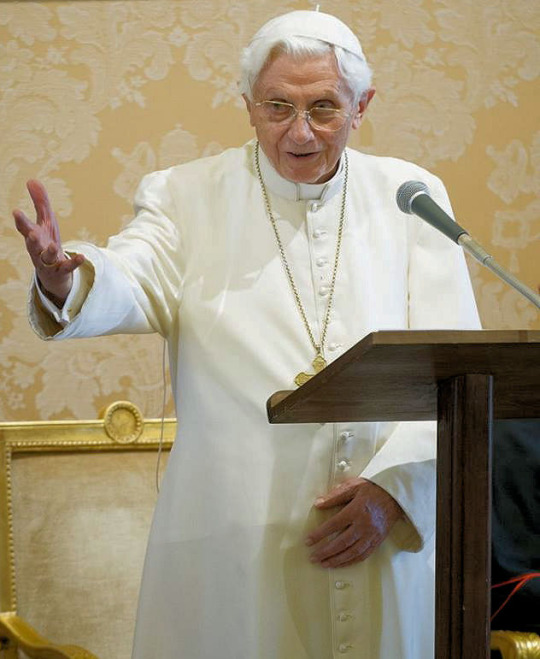
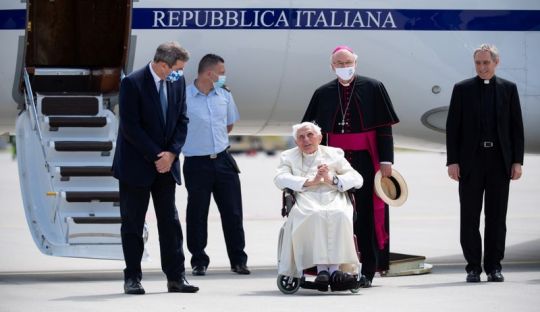
Benedict XVI passed away January 31st, 2023.

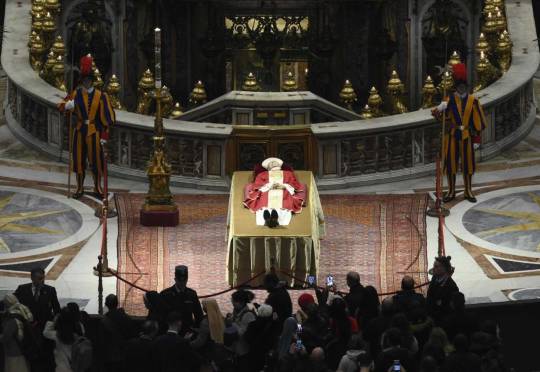
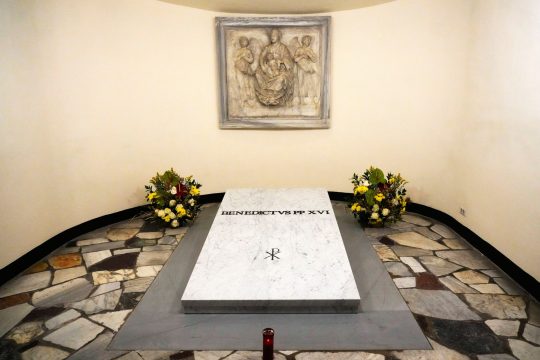
Loved by many and disliked by many, Pope Benedict XVI leaves behind a legacy that will be discussed for a great many years.
#My post#Pope Benedict XVI#Pope Emeritus Benedict XVI#Pope Emertius#Joseph Ratzinger#Professor#Archbishop#Cardinal#Pope#Birthday#96th Birthday#Catholic Church#happy heavenly birthday
0 notes
Text
“Detached from the bond with fecundity, sex no longer appears to be a determined characteristic, as a radical and pristine orientation of the person. Male? Female? They are questions that for some are now viewed as obsolete, senseless, if not racist.... It is not by chance that among the battles of "liberation" of our time there has also been that of escaping from the "slavery of nature" ... But one cannot struggle against nature without undergoing the most devastating consequences. The sacrosanct equality between man and woman does not exclude, indeed it requires, diversity.”
-Joseph Cardinal Ratzinger, The Ratzinger Report
7 notes
·
View notes
Text
The theology of littleness is a basic category of Christianity. After all, the tenor of our faith is that God's distinctive greatness is revealed precisely in powerlessness. That in the long run, the strength of history is precisely in those who love, which is to say, in a strength that, properly speaking, cannot be measured according to categories of power. So in order to show who he is, God consciously revealed himself in the powerlessness of Nazareth and Golgotha. Thus, it is not the one who can destroy the most who is the most powerful...but, on the contrary, the least power of love is already greater than the greatest power of destruction. ― Joseph Cardinal Ratzinger/Pope Benedict
14 notes
·
View notes
Text
SAINT OF THE DAY (July 5)

On July 5, the Catholic Church remembers Saint Anthony Mary Zaccaria.
A renowned preacher and promoter of Eucharistic adoration, he founded the order of priests now known as the Barnabites.
In 2001, the future Pope Benedict XVI, Cardinal Joseph Ratzinger, wrote the preface for a book on St. Anthony Mary Zaccaria, praising the saint as “one of the great figures of Catholic reform in the 1500s who was involved in the renewal of Christian life in an era of profound crisis.”
"The Italian saint deserves to be rediscovered as an authentic man of God and of the Church, a man burning with zeal, a demanding forger of consciences, a true leader able to convert and lead others to good.”
Anthony Mary Zaccaria was born into an Italian family of nobility in Cremona during 1502.
His father Lazzaro died shortly after Anthony's birth, and his mother Antonietta – though only 18 years old – chose not to marry again, preferring to devote herself to charitable works and her son's education.
Antonietta's son took after her in devotion to God and generosity toward the poor.
He studied Latin and Greek with tutors in his youth. He was afterward sent to Pavia to study philosophy.
He went on to study medicine at the University of Padua, earning his degree at age 22 and returning to Cremona.
Despite his noble background and secular profession, the young doctor had no intention of either marrying or accumulating wealth.
While caring for the physical conditions of his patients, he also encouraged them to find spiritual healing through repentance and the sacraments.
Anthony also taught catechism to children and went on to participate in the religious formation of young adults.
He eventually decided to withdraw from the practice of medicine, and with the encouragement of his spiritual director, he began to study for the priesthood.
Ordained a priest at age 26, Anthony is said to have experienced a miraculous occurrence during his first Mass, being surrounded by a supernatural light and a multitude of angels during the consecration of the Eucharist.
Contemporary witnesses marveled at the event and testified to it after his death.
Church life in Cremona had suffered decline in the late 15th and early 16th centuries.
The new priest encountered widespread ignorance and religious indifference among laypersons, while many of the clergy were either weak or corrupt.
In these dire circumstances, Anthony Mary Zaccaria devoted his life to proclaiming the truths of the Gospel both clearly and charitably.
Within two years, his eloquent preaching and tireless pastoral care is said to have changed the moral character of the city dramatically.
In 1530, Anthony moved to Milan, where a similar spirit of corruption and religious neglect prevailed.
There, he decided to form a priestly society, the Clerics Regular of St. Paul.
Inspired by the apostle's life and writings, the order was founded on a vision of humility, asceticism, poverty, and preaching.
After the founder's death, they were entrusted with a prominent church named for St. Barnabas and became commonly known as the “Barnabites.”
The priest also founded a women's religious order, the Angelic Sisters of St. Paul, and an organization, the Laity of St. Paul, geared toward the sanctification of those outside the priesthood and religious life.
He pioneered the “40 Hours” devotion, involving continuous prayer before the Blessed Sacrament.
In 1539, Anthony became seriously ill and returned to his mother's house in Cremona.
The founder of the Clerics Regular of St. Paul died on 5 July 1539, during the liturgical octave of the Feast of Saints Peter and Paul, at the age of only 36.
Nearly three decades after his death, St. Anthony Mary Zaccaria's body was found to be incorrupt.
Pope Leo XIII beatified him on 3 January 1890 and canonized on 27 May 1897.
4 notes
·
View notes
Text
Events 4.19 (after 1940)
1942 – World War II: In German-occupied Poland, the Majdan-Tatarski ghetto is established, situated between the Lublin Ghetto and a Majdanek subcamp. 1943 – World War II: In German-occupied Poland, the Warsaw Ghetto Uprising begins, after German troops enter the Warsaw Ghetto to round up the remaining Jews. 1943 – Albert Hofmann deliberately doses himself with LSD for the first time, three days after having discovered its effects on April 16, an event commonly known and celebrated as Bicycle Day. 1956 – Actress Grace Kelly marries Prince Rainier of Monaco. 1960 – Students in South Korea hold a nationwide pro-democracy protest against president Syngman Rhee, eventually forcing him to resign. 1971 – Sierra Leone becomes a republic, and Siaka Stevens the president. 1971 – Launch of Salyut 1, the first space station. 1971 – Charles Manson is sentenced to death (later commuted to life imprisonment) for conspiracy in the Tate–LaBianca murders. 1973 – The Portuguese Socialist Party is founded in the German town of Bad Münstereifel. 1975 – India's first satellite Aryabhata launched in orbit from Kapustin Yar, Russia. 1975 – South Vietnamese forces withdrew from the town of Xuan Loc in the last major battle of the Vietnam War. 1976 – A violent F5 tornado strikes around Brownwood, Texas, injuring 11 people. Two people were thrown at least 1,000 yards (910 m) by the tornado and survived uninjured. 1984 – Advance Australia Fair is proclaimed as Australia's national anthem, and green and gold as the national colours. 1985 – Two hundred ATF and FBI agents lay siege to the compound of the white supremacist survivalist group The Covenant, the Sword, and the Arm of the Lord in Arkansas; the CSA surrenders two days later. 1987 – The Simpsons first appear as a series of shorts on The Tracey Ullman Show, first starting with "Good Night". 1989 – A gun turret explodes on the USS Iowa, killing 47 sailors. 1993 – The 51-day FBI siege of the Branch Davidian building in Waco, Texas, USA, ends when a fire breaks out. Seventy-six Davidians, including 18 children under age 10, died in the fire. 1995 – Oklahoma City bombing: The Alfred P. Murrah Federal Building in Oklahoma City, USA, is bombed, killing 168 people including 19 children under the age of six. 1999 – The German Bundestag returns to Berlin. 2000 – Air Philippines Flight 541 crashes in Samal, Davao del Norte, killing all 131 people on board. 2001 – Space Shuttle Endeavour is launched on STS-100 carrying the Canadarm2 to the International Space Station. 2005 – Cardinal Joseph Ratzinger is elected to the papacy and becomes Pope Benedict XVI. 2011 – Fidel Castro resigns as First Secretary of the Communist Party of Cuba after holding the title since July 1961. 2013 – Boston Marathon bombing suspect Tamerlan Tsarnaev is killed in a shootout with police. His brother Dzhokhar is later captured hiding in a boat inside a backyard in the suburb of Watertown. 2020 – A killing spree in Nova Scotia, Canada, leaves 22 people and the perpetrator dead, making it the deadliest rampage in the country's history. 2021 – The Ingenuity helicopter becomes the first aircraft to achieve flight on another planet.
4 notes
·
View notes
Text
« Un Jésus-Christ qui serait d'accord avec tout et avec tous, un Jésus-Christ auquel manquerait la « sainte colère », la dureté de la Vérité et l'Amour du vrai, ne serait pas le Jésus authentique tel que l'Écriture nous le montre, mais une pitoyable caricature. Un Jésus qui approuve tout est un Jésus sans Croix, car alors il n'y a plus besoin de la douleur de la Croix pour guérir l'homme... Le pardon a quelque chose à voir avec la Verité et pour cela il exige la Croix du Fils de notre conversion. »
Cardinal Joseph Ratzinger. Extrait d'une retraite prêchée en 1986.
2 notes
·
View notes
Text
Many of these trees were my friends, creatures I had known from nuts and acorns; many had voices of their own that are lost forever now. And there are wastes of stump and bramble where there were singing groves. ― Treebeard
Joseph Ratzinger and the Organic Metaphor
Dom Alcuin Reid’s monograph, The Organic Development of the Liturgy (Ignatius Press, 2005), represents a significant contribution to the rediscovery of the liturgical Tradition that had been obscured by the “mutation” following the replacement of the Liturgy of the Ages with the liturgy of Pope Paul VI. A careful reading of this volume, including the preface by Joseph Cardinal Ratzinger, highlighted for me from the very beginning the importance of the “organic development” of the Holy Liturgy. Without being a committed traditionalist thinker, Joseph Ratzinger had the courage to speak about the devastating consequences of replacing a liturgy developed organically under the guidance of the Holy Spirit with a manufactured liturgy.
Among the vast works of Pope Benedict XVI, perhaps the most significant reflections related to this theme can be found in Milestones: Memoirs 1927–1977 (Ignatius Press, 1988, pp. 146–149). Here, the author first recalls the shock he experienced upon hearing about the prohibition of the Liturgy of the Ages. In his diplomatic style, he makes this assertion somewhat indirectly, referring to the missal:
I was dismayed by the prohibition of the old missal, since nothing of the sort had ever happened in the entire history of the liturgy.
What matters here is the categorical nature of this statement: it is declared unequivocally that such a thing had never occurred in the entire history of the Church. This characterization of an unprecedented event must be for us an extremely important clue. We should take note of it, especially since it seems we are living in an era of unprecedented events. (How frequently in history do we find pontiffs who not only altered Church discipline—related to divorced people—but even changed the prayer Pater Noster?).
0 notes
Text

DAILY SCRIPTURE READINGS (DSR) 📚 Group, Tue Dec 10th, 2024 ... Tuesday Of The Second Week Of Advent, Year C ... THE HOLY UGANDA MARTYRS WINDOW
UGANDA MARTYRS: UNYIELDING FAITH
The Church marks the Feast of the Uganda Martyrs on June 03rd, a day that in Uganda is a national holiday.
WHO WERE THESE MARTYRS, AND WHAT IS THEIR STORY?
It is one with a remarkable relevance for today. These martyrs were boys in their teens, and they died for their Christian faith—and, more especifically, because they refused to take part in homosexual activities. For their commitment to their faith and to its clear moral teachings, these 22 boys died in a particularly horrific manner: they were killed in all brutal ways but above all, burned alive.
Today, Catholics have to stand with courage when speaking about homosexuality. To affirm the Church’s teaching is to invite ridicule and insults—and, increasingly, to face legal difficulties. In Britain for instance, new legislation has forced Catholic adoption agencies to choose between closure and agreeing to offer children to homosexual couples. A Catholic broadcaster received a visit from the police after she spoke against homosexual adoption on a radio program—she was warned that she might have committed a “homophobic” offense.
Years ago the Church published a document (signed by then-Cardinal Joseph Ratzinger) that affirmed its teaching on homosexuality and offered some details concerning the pastoral care of people with homosexual tendencies. The date chosen for the announcement was June 3: the feast of the Uganda Martyrs.
FAITH EMBRACED —AND REJECTED
The story of the heroic young Uganda martyrs begins with the arrival in the late 1880s of European missionaries, both Anglican and Catholic, in the territory then known as Buganda. They found a local culture and community that was warmly open to the Christian message and to news and information from the wider world. But as Christianity began to permeate local life, tensions arose. The ruler, the Kabaka, died, and his son and heir to the throne inherited the reigns of power. This new ruler, King Mwanga, a dissolute and spoilt youth, felt threatened by the vigor and openness of mind shown by the young pages at his court who had converted to Christianity. Chief among these was Charles Lwanga, a tall and handsome youth who was a natural leader, excelling in sports and hunting. He was also one whose life of prayer and evident integrity influenced his fellows and drew them to ask questions about what inspired him.
Fear of the political and military intentions of the European powers—especially Britain—also played a part in what was to come. A visiting Anglican missionary, Bishop James Hannington, was murdered on the orders of the Kabaka. Dying with courage and dignity, he showed a faith that impressed the local people. After his death one of King Mwanga’s subjects, Joseph Mukasa Balikuddembe, rebuked the king. For his audacious courage to defend life, he was savagely beheaded. A wave of persecution was just beginning.
In the martyrdom that followed, boys who had become Christians—Catholic and Anglican—found their faith tested to its keenest limits. The Catholics had been attending prayers and catechism classes with the missionaries. Some had been baptized; others were still under instruction. A separate group of boys had for some while been attending the Anglican mission and had been baptized there. The atmosphere at court had been profoundly affected by all of this: the example of both Anglicans and Catholics influenced palace members and others in the Kingdom and beyond.
A THWARTED KING ’S FURY
Initially, the young Kabaka also had been impressed by Christianity: he liked what he saw and heard of the Christian message, and he also recognized that his people would benefit from the education and skills that the missionaries had brought with them. Moreover, guns, gun gunpowder, and other gifts from the missionaries attracted and enabled him project power and that of his kingdom. But this was not enough to counter his other, stronger, commitment—to a dissolute lifestyle, and especially to witchcraft and homosexual activities to which he had become increasingly addicted.
After some weeks of tension, which stretched over Eastertide, the young men at court sensed that a major drama was about to unfold. One afternoon, after an unsuccessful day’s hunt on lake Victoria, King Mwanga sent for Mwafu, his favourite page boy, whom he wanted to engage in homosexual gratification. The boy could not be found, and the king, in a rage, started to shout about the disloyalty and insolence he found at court. He knew that the boy’s absence was almost certainly due to Christians diverting him to their activities so that he would not have to face the Kabaka’s advances. He knew it was likely the boy had absented himself because he was hiding away from his engagement. Rounding up the boys known to be the keenest Christians, he ranted and hurled insults at them. He also demanded that they give up their ways of prayer and return to unstinting obedience to him in all things.
It became clear in the days that followed that homosexual activity and willingness to comply with immorality were the heart of the matter—the Kabaka’s rage had been fueled by the increasing reluctance of his young Christian subjects to indulge him in this. Death was the punishment for opposing the whims and wishes of this absolute sovereign.
But the boys stood firm. Arrested and bound, with ropes cutting into their wrists and feet, they prayed and sang hymns. The older boys, especially Charles Lwanga, taught and encouraged the younger ones, notably Kizito. The youngest of all, Kizito was just 14, and alternated between radiant enthusiasm for Christ and a shaking fear of the death that now awaited them.
DEATH TO “THOSE WHO PRAY”
The tribal ritual surrounding executions was grim. As the boys watched it begin, it must have struck terror into their hearts. The executioners, dressed in leopard skins and with their faces painted white in traditional designs, wove in long dances as they wailed a chant while the victims watched: “The mothers of these will weep today—O yes, they will weep today.”
Had any of the boys agreed to abandon their prayers and obey the Kabaka, their lives would have been saved. The Kabaka specifically referred to the Christian boys as “those who pray.” Any who chose to leave that category and renounce their Christian faith could walk back into favor with the ruler.
Namugongo, the site for executions, was a 16km distance from the Kabaka’s Munyonyo court that was at Victoria lake shore, and the journey there took several days. For some of the boys, tight shackles made walking difficult and a number were executed along the way. Those who arrived at Namugongo were crammed into prison huts within the locality of their execution. This was done to buy time for executioners to cut sufficient firewood and build the great funeral pyre upon which the Christians would be burned alive.
On the day of execution, June 3rd 1886, Charles Lwanga was separated from the main group and burnt on a lone pyre slightly over a kilometre before the main pyre where all the rest of Catholic and Anglican pages were burnt. Already bound and ready for burning, Charles Lwanga surprised his executioner whom he asked to untie him so he could lay well his own pyre. With unparalleled courage, he was placed back on the pyre and burnt slowly from toe to head. It's on this very spot of his martyrdom that today an Altar stands in a Shrine built and consecrated a minor Basilica. This Catholic Shrine has been visited by three Popes (St Paul VI in 1969, St John Paul II in 1993, and Pope Francis in 2015).
The many eyewitnesses to the martyrdom (the boys were killed in front of a large crowd of their own family members and friends) left a detailed account of the events.
This execution of Uganda Martyrs reads rather like the early martyrdoms of Christians in pagan Rome. Extraordinary scenes transpired. The boys prayed and sang hymns as they were rolled and tied in reed matting and dragged to the fire. Young Kizito is said to have gone to his martyrdom singing and calling out that soon he would meet Christ in paradise. As the flames were lit, the prayers did not stop. The young boys’ voices could be heard, clear and unafraid, as the fire crackled up to meet them.
When all was over, mounds of burnt wood and ashes remained, to become one day the rallying base of a great shrine which is now visited by millions of people annually. Every year, on June 3, vast crowds arrive for an open-air Mass. Children are given the day off school. Kizito is a popular name for boys in Uganda and beyond, and his story is told to First Communion and confirmation groups.
AN URGENT WITNESS TODAY
The Ugandan Martyrs were formally canonized in 1964, the first time that African drums were used in a ceremony at St. Peter’s in Rome. The emergence of Africa as a new stronghold of Christianity, the ecumenical dimension, the proximity of all this to the Second Vatican Council which was opening up a new chapter in the Church’s history—all gave the canonization a special sense of historic importance. But at that time no one thought to remark on the moral teachings at the center of it all: that the martyrs had witnessed with their lives to the truth that sexual communion is reserved to men and women in the lifelong bond of marriage and that homosexual activity is gravely sinful. In 1964, that was simply taken for granted by Anglicans and Catholics alike.
Today, however, we see the boys’ martyrdom as having an extra dimension of significance precisely because of this truth and their courageous witness to it. God speaks to us poignantly through the heroism of these youths. Their witness calls us to join them in courage and faith. We have been given their example at a time when we all need it.
The Catechism of the Catholic Church, affirming unchanging truths of the Catholic faith for a new century, quotes Scripture and Tradition in describing homosexual acts as intrinsically disordered and contrary to the moral law. It calls for respect, compassion, and sensitivity towards those who—like the young Kabaka—struggle with homosexual tendencies and calls them to chastity and Christian perfection. The Catechism also hails martyrdom as “the supreme witness given to the truth of the faith: it means bearing witness even unto death” (CCC 2473). The Catechism notes “The Church has painstakingly collected the records of those who persevered to the end in witnessing to their faith. These are the acts of the martyrs. They form the archives of truth written in letters of blood” (2474).
TWO CHURCHES, ONE MARTYRDOM
A most touching aspect to this story of martyrdom is that both Catholic and Anglican boys were caught up in this drama. The Catholic Church does not presume to impose its forms of canonization on those who are not members—but in the ceremony in Rome which was to write the Ugandan Martyrs into the Church’s calendar, special mention with honor was made of the boys of the Anglican Communion who met their deaths—and whose names, incidentally, are recorded on a great memorial in the Anglican Cathedral in Uganda’s capital.
**
VICARIATE APOSTOLIC OF UPPER NILE
Vicariate Apostolic of Upper Nile, separated from the mission of Nyanza, July 6, 1894, comprises the eastern portion of Uganda, that is roughly east of a line from Fauvera on the Nile (about 2° 13′ N. lat.), northeast to the Kaffa mountains, and of a line south from Fauvera past Munyonyo near Lake Victoria Nyanza to 1° S. lat. Of the native tribes, the Baganda, the largest ethnic tribe, accessed formal education before others. Their religion was spiritualistic, acknowledging a Divine Providence, Katonda, who, being good, was neglected, while the loubalis, or demon, and mizimus, or departed souls, were propitiated. Totemism was prevalent, the amaziro, or totem, being usually an animal, rarely a plant. The first Catholic missionaries, the White Fathers, arrived in Uganda in 1878. Father Lourdel obtained leave from King Mutesa to enter; on June 26, 1879, the fathers reached Rubaga.
On Easter Saturday, March 27, 1880, the first catechumens were baptized; two years later the Arabs induced Mutesa to expel the missionaries; they returned under his successor, Mwanga, July 14, 1885. Religion spread rapidly, but the Protestants and Arabs stirred up the king to begin a persecution. Joseph Mukasa, chief of the royal pages, was the proto-martyr; on May 26, 1886, thirty newly baptized Catholics, on refusing to apostatize, were burnt to death; soon more than seventy others were martyred. Then the Arabs plotted to depose Mwanga, but the Catholics by the advice of Father Lourdel remained loyal. The Arabs thereupon expelled the missionaries, who, however, returned in 1889: Father Lourdel endeavored to induce Mwanga to submit to the advancing British Company; on May 12, 1890, worn out by his labors this pioneer of the Gospel died. His confreres continued to reap a rich harvest, but were opposed by Captain Lugard, the British Company’s agent. On May 23, 1893, Uganda passed under the protection of the British Government and the Church gained comparative peace. Msgr. Livinhac, now Superior General of the White Fathers, obtained the erection of the eastern portion of Uganda into a separate vicariate under the care of the English congregation of Foreign Missions, Mill Hill, London.
The first vicar Apostolic was Msgr. Henry Hanlon, b. on January 7, 1862, consecrated titular Bishop of Teos in 1894, went to Uganda in 1895; after laboring there for seventeen years, he returned to England for the general chapter of his Society, and retired from active missionary work. He was succeeded (June, 1912) by Msgr. John Biermans, titular Bishop of Gargara. Coming to Uganda in 1896 he proved himself a valuable auxiliary to Msgr. Hanlon. The episcopal residence is at Mengo, Buganda, near Entebbe, capital (then) of Uganda. In the mission there were 24 priests, 6 Missionary Franciscan Sisters of Mary; 15 churches; 12 schools with 1649 pupils; and about 20,000 Catholics. The missionaries have recently compiled and printed in Uganda, a grammar, phrasebook, and vocabulary of a Nilotic language, Dho Levo, spoken in Kavirondo. The language had not previously been reduced to writing. Some primers, catechisms, and prayerbooks also in Dho Levo have been printed.
**
VICARIATE APOSTOLIC OF NORTHERN VICTORIA NYANZA
The Mission of Victoria Nyanza, founded in 1878 by the White Fathers of Cardinal Lavigerie, was erected into a vicariate Apostolic May 31, 1883, with Msgr. Livinhac as the first vicar Apostolic. When the latter was raised to the superior-generalship of the Society of White Fathers (October, 1889), the Holy See appointed Msgr. Hirth as his successor. A Decree of July 6, 1894, divided Victoria Nyanza into three autonomous missions: that of Southern Nyanza in the German Protectorate, of which Msgr. Hirth retained the government and became the first titular; those of the Upper Nile and Northern Nyanza, in English territory, the former given to the Fathers of Mill Hill and the second to the White Fathers. From the 18 provinces of Uganda the Decree of 1894 detached that of Kyaggive and Kampala Mengo, which it placed under the jurisdiction of the Fathers of Mill Hill, and gave to Northern Nyanza the remaining 17 provinces of the Kingdom of Uganda, the three Kingdoms of Bunyoro, Toro, and Ankole, and in the Belgian Congo an isosceles triangle whose top was the northern point of Lake Albert Nyanza and whose base followed the 30th degree of longitude. Three races share the portion of Northern Nyanza lying in the English protectorate; the first, that of the Baganda, is represented by 670,000 inhabitants, and has given the strongest support to evangelization, and in 1886 had the courage and the honor to give to the Church its first negro martyrs. The second race, the Banyoro, is represented by 520,000 aborigines; the third, the Bahima (Hamites), the leading class in the shepherd Kingdom of Ankole, is in a minority not exceeding 50,000 souls. The total population of Northern Nyanza equals therefore about 1,500,000 inhabitants, of whom 1,400,000 are in English territory, and 360,000 in the Congo country.
At the time of its creation (July, 1894) Northern Nyanza had an administrator, 17 missionaries divided among 5 stations, 15,000 neophytes and 21,000 catechumens. In July, 1896, the date of the death of Msgr. Guillerman, the first vicar Apostolic, the vicariate had 6 stations, 21 missionaries, and 20,000 baptized Christians. In July, 1911, it had 1 bishop, Msgr. Henri Streicher (preconized February 2, 1897), Bishop of Tabarca and second vicar Apostolic of Southern Nyanza, 118 missionaries divided among 28 stations, 113,810 neophytes and 97,630 catechumens. All the missionaries of Northern Nyanza, including the vicar Apostolic, are members of the Society of White Fathers founded by Cardinal Lavigerie. As yet the native clergy consists only of 2 subdeacons, 4 minor clerics, and 4 tonsured clerics. They are assisted by 28 European religious of the Society of White Sisters, and by an institute of native religious called the Daughters of Mary. Eleven hundred and five Baganda and Banyoro teachers cooperate in the educational work and in the service of 832 churches or chapels. The Vicariate of Northern Nyanza has 894 scholastic establishments, viz. a lower seminary with 80 students, and upper seminary with 16 students in philosophy and theology, a high school with 45 pupils, most of them the sons of chiefs, a normal school with 62 boarders, and 890 primary schools in which free instruction is given to 19,157 pupils, of whom 11,244 are boys and 7913 girls. The annual report of the vicar Apostolic from June, 1910, to June, 1911, shows 7930 confirmations, 1154 marriages, 578,657 confessions heard, 1,236,126 communions administered, and the gratuitous distribution of 394,495 remedies. The headquarters of the mission is at Villa Maria, near Masaka, Uganda. There are situated the residence of the bishop, the two seminaries, a flourishing mission station, the central house of the White Sisters, the novitiate of the native sisters, and a printing establishment where there is published monthly in the Luganda language an interesting 16-page magazine entitled “Munno”, which has 2000 native subscribers. Entebbe is the seat of the procurator of the vicariate.
***
Compiled and slightly edited from Catholic sources by #CharlesOngoleJohn
【Build your Faith in Christ Jesus on #dailyscripturereadingsgroup 📚: +256 751 540 524 .. Whatsapp】
0 notes
Text
Prestigious Ratzinger Prize awarded to Notre Dame theologian, Japanese sculptor at Vatican
The Joseph Ratzinger-Benedict XVI Vatican Foundation awards the Ratzinger Prize to Notre Dame theologian Cyril O’Regan and Japanese sculptor Etsurō Sotoo at in a ceremony at the Vatican on Nov. 22, 204. / Credit: Daniel Ibañez/CNA Vatican City, Nov 22, 2024 / 14:35 pm (CNA). Vatican Secretary of State Cardinal Pietro Parolin awarded the Ratzinger Prize to University of Notre Dame theologian…
0 notes
Text
Gustavo Gutiérrez: The Icon of Latin American Liberation Theology Passes at 96
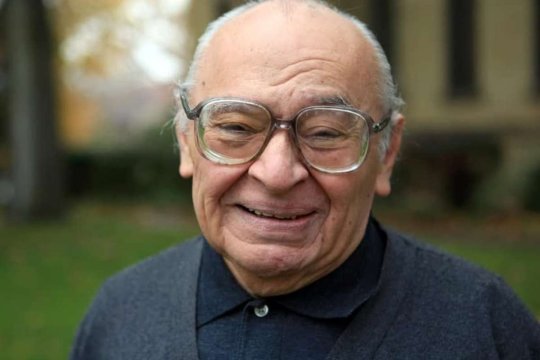
Source: cruxnow.com
Share Post:
LinkedIn
Twitter
Facebook
Reddit
Gustavo Gutiérrez, a towering figure in Latin American Catholicism, passed away on October 22 at the age of 96, leaving behind a legacy that shaped the spiritual and social landscape of the region. Often regarded as the father of Liberation Theology, Gutiérrez’s work both inspired and polarized the Catholic Church. His groundbreaking ideas advocating for the poor became a defining force in post-Vatican II Latin America, marking a sharp division between supporters and critics.
Just days before his death, Cardinal-elect Carlos Gustavo Castillo Mattasoglio of Lima underscored the enduring tensions surrounding Gutiérrez’s theology. In a public statement, Castillo criticized the Sodalitium Christianae Vitae, a lay group in Peru, accusing them of unjustly persecuting Gutiérrez. “They considered him a leftist,” Castillo wrote, while defending Gutiérrez as someone who merely sought to renew faith in a way that resonated with Latin America’s poor and deeply religious population.
The Birth of Liberation Theology
Gustavo Gutiérrez’s journey toward theological prominence began in 1968, when he served as an advisor to the Latin American bishops at the Medellín conference. Out of this experience, he developed a book that would forever change the course of Latin American Catholicism. Initially intended to be titled Towards a Theology of Development, the book was eventually published in 1971 as Toward a Theology of Liberation. This work laid the foundation for Liberation Theology, which sought to interpret the Christian Gospel through the lens of social justice and the struggles of the poor.
However, Gustavo Gutiérrez’s ideas sparked controversy, especially during the 1980s. In 1983, then-Cardinal Joseph Ratzinger (later Pope Benedict XVI) asked Peruvian bishops to investigate Gutiérrez’s theology, accusing it of promoting a Marxist interpretation of history and focusing excessively on material redemption. The investigation deeply divided the bishops, with some preparing to issue a negative judgment. Yet, a last-minute intervention from the esteemed Jesuit theologian, Father Karl Rahner, prevented such a conclusion. Rahner passionately defended Gutiérrez, asserting that his theology was orthodox and cautioning against any attempt to suppress the pluralism of theological schools.
Though no official sanctions were imposed, Gutiérrez continued to face resistance from conservative elements within the church. Cardinal Juan Luis Cipriani Thorne of Lima, a notable critic, accused Gutiérrez’s theology of undermining the church’s authority, fostering political activism among priests, and creating a “parallel magisterium.”
A Legacy that Transcends Theology
Despite the opposition, Gustavo Gutiérrez’s influence extended far beyond the confines of theological debates. His commitment to the poor and marginalized earned him international recognition, including nearly 20 honorary degrees and the prestigious French Legion of Honor in 1993 for his work in promoting human dignity. In addition to his academic contributions, he founded the Bartolomé de Las Casas Institute in Lima and held professorships at the University of Notre Dame and other institutions.
Those who encountered Gutiérrez were often struck by his diminutive stature, which belied the profound impact of his intellect. Comparisons to the wise Yoda from Star Wars were not uncommon, but Gutiérrez’s influence on the global Catholic Church was anything but small. His ideas about social justice, the role of faith in political activism, and the rights of the poor left an indelible mark on the 20th-century church.
As the Catholic world reflects on his life, there is little doubt that Gustavo Gutiérrez’s work mattered. His absence will be felt not only in theological circles but also in the broader conversation about faith, justice, and the future of the church in Latin America.
#GustavoGutiérrez#LiberationTheology#Catholicism#SocialJustice#Theology#LatinAmerica#FaithAndJustice#Legacy#RestInPeace#HumanDignity
1 note
·
View note
Text
Pope Francis says Benedict XVI "knew the language of cats"
New Post has been published on https://petn.ws/SWUnw
Pope Francis says Benedict XVI "knew the language of cats"
In his latest book-interview, in addition to revelations on subjects such as the 2005 conclave, Pope Francis fondly remembers Benedict XVI’s love of cats. In El Sucesor (“The Successor”), a book-interview with Spanish Vaticanist Javier Martínez-Brocal published in Spanish on April 3, Pope Francis explains that he met Cardinal Joseph Ratzinger, then Prefect of the […]
See full article at https://petn.ws/SWUnw #CatsNews
0 notes
Text
The new document signed by Pope Francis and DDF Prefect Cardinal Victor Fernández was written in response to a bishop from the Philippines who had expressed concern at the growing number of Catholics in his diocese who are taking part in Freemasonry and asked for suggestions for how to respond pastorally. The dicastery’s response, dated Nov. 13, calls for “a coordinated strategy” involving all of the bishops in the Catholic Bishops’ Conference of the Philippines to promote catechesis “in all parishes regarding the reasons for the irreconcilability between the Catholic faith and Freemasonry.” The Freemasons are the largest worldwide oath-bound secret society. Freemasonry promotes ideas and rituals incompatible with the Catholic faith, including indifferentism, or the position that a person can be equally pleasing to God while remaining in any religion, and a deistic concept of a “Great Architect of the Universe.” The Vatican document reaffirms that “those who are formally and knowingly enrolled in Masonic Lodges and have embraced Masonic principles” fall under the provisions of the Catholic Church’s 1983 “Declaration on Masonic Associations.” The 1983 declaration, signed by Cardinal Joseph Ratzinger when he was prefect of the Congregation for the Doctrine of the Faith, declares that Catholics who enroll in Masonic associations “are in a state of grave sin and may not receive holy Communion.”
33 notes
·
View notes
Text
To have Christian hope means to know about evil and yet to go to meet the future with confidence. The core of faith rests upon accepting being loved by God, and therefore to believe is to say Yes, not only to him, but to creation, to creatures, above all, to men, to try to see the image of God in each person and thereby to become a lover. That's not easy, but the basic Yes, the conviction that God has created men, that he stands behind them, that they aren't simply negative, gives love a reference point that enables it to ground hope on the basis of faith. ― Joseph Cardinal Ratzinger/Pope Benedict
8 notes
·
View notes
Text
SAINT OF THE DAY (July 5)

On July 5, the Catholic Church remembers Saint Anthony Mary Zaccaria.
A renowned preacher and promoter of Eucharistic adoration, he founded the order of priests now known as the Barnabites.
In 2001, the future Pope Benedict XVI, Cardinal Joseph Ratzinger, wrote the preface for a book on St. Anthony Mary Zaccaria, praising the saint as “one of the great figures of Catholic reform in the 1500s, who was involved in the renewal of Christian life in an era of profound crisis.”
The Italian saint, Cardinal Ratzinger wrote, “deserves to be rediscovered as an authentic man of God and of the Church, a man burning with zeal, a demanding forger of consciences, a true leader able to convert and lead others to good.”
Anthony Mary Zaccaria was born into an Italian family of nobility in Cremona during 1502.
His father Lazzaro died shortly after Anthony's birth, and his mother Antonietta – though only 18 years old – chose not to marry again, preferring to devote herself to charitable works and her son's education.
Antonietta's son took after her in devotion to God and generosity toward the poor. He studied Latin and Greek with tutors in his youth. He was then sent to Pavia to study philosophy.
He went on to study medicine at the University of Padua, earning his degree at age 22 and returning to Cremona.
Despite his noble background and secular profession, the young doctor had no intention of either marrying or accumulating wealth.
While caring for the physical conditions of his patients, he also encouraged them to find spiritual healing through repentance and the sacraments.
Anthony also taught catechism to children and went on to participate in the religious formation of young adults.
He eventually decided to withdraw from the practice of medicine, and with the encouragement of his spiritual director, he began to study for the priesthood.
Ordained a priest at age 26, Anthony is said to have experienced a miraculous occurrence during his first Mass, being surrounded by a supernatural light and a multitude of angels during the consecration of the Eucharist.
Contemporary witnesses marveled at the event and testified to it after his death.
Church life in Cremona had suffered decline in the late 15th and early 16th centuries.
The new priest encountered widespread ignorance and religious indifference among laypersons, while many of the clergy were either weak or corrupt.
In these dire circumstances, Anthony Mary Zaccaria devoted his life to proclaiming the truths of the Gospel —both clearly and charitably.
Within two years, his eloquent preaching and tireless pastoral care is said to have changed the moral character of the city dramatically.
In 1530, Anthony moved to Milan, where a similar spirit of corruption and religious neglect prevailed.
There, he decided to form a priestly society, the Clerics Regular of St. Paul.
Inspired by the apostle's life and writings, the order was founded on a vision of humility, asceticism, poverty, and preaching.
After the founder's death, they were entrusted with a prominent church named for St. Barnabas and became commonly known as the “Barnabites.”
The priest also founded a women's religious order, the Angelic Sisters of St. Paul, and an organization, the Laity of St. Paul, geared toward the sanctification of those outside the priesthood and religious life.
He pioneered the “40 Hours” devotion, involving continuous prayer before the Blessed Sacrament, promoted the use of altar sacraments, and initiated the ringing of church bells every Friday at 3 p.m.
In 1539, Anthony became seriously ill and returned to his mother's house in Cremona.
The founder of the Clerics Regular of St. Paul died on 5 July 1539, during the liturgical octave of the Feast of Sts. Peter and Paul, at the age of only 36.
Nearly three decades after his death, St. Anthony Mary Zaccaria's body was found to be incorrupt.
Pope Leo XIII beatified him on 3 January 1890 and canonized on 27 May 1897.
In art, he is depicted wearing the black cassock of the Order and holding a lily, cross, chalice and/or a host.
4 notes
·
View notes
Text
Events 11.25 (after 1920)
1926 – The deadliest November tornado outbreak in U.S. history kills 76 people and injures more than 400. 1936 – In Berlin, Germany and Japan sign the Anti-Comintern Pact, agreeing to consult on measures "to safeguard their common interests" in the case of an unprovoked attack by the Soviet Union against either nation. 1941 – HMS Barham is sunk by a German torpedo during World War II. 1943 – World War II: Statehood of Bosnia and Herzegovina is re-established at the State Anti-fascist Council for the National Liberation of Bosnia and Herzegovina. 1947 – Red Scare: The "Hollywood Ten" are blacklisted by Hollywood movie studios. 1947 – New Zealand ratifies the Statute of Westminster and thus becomes independent of legislative control by the United Kingdom. 1950 – The Great Appalachian Storm of 1950 impacts 22 American states, killing 353 people, injuring over 160, and causing US$66.7 million in damages (1950 dollars). 1952 – Agatha Christie's murder-mystery play The Mousetrap opens at the Ambassadors Theatre in London's West End after a premiere in Nottingham, UK. It will become the longest continuously running play in history. 1952 – Korean War: After 42 days of fighting, the Battle of Triangle Hill ends in a Chinese victory. American and South Korean units abandon their attempt to capture the "Iron Triangle". 1958 – French Sudan gains autonomy as a self-governing member of the French Community. 1960 – The Mirabal sisters of the Dominican Republic are assassinated. 1963 – State funeral of John F. Kennedy; after lying in state at the United States Capitol, a Requiem Mass takes place at Cathedral of St. Matthew the Apostle and the President is buried at Arlington National Cemetery. 1968 – The Old Student House in Helsinki, Finland is occupied by a large group of University of Helsinki students. 1970 – In Japan, author Yukio Mishima and one compatriot commit ritualistic seppuku after an unsuccessful coup attempt. 1973 – Georgios Papadopoulos, head of the military Regime of the Colonels in Greece, is ousted in a hardliners' coup led by Brigadier General Dimitrios Ioannidis. 1975 – Coup of 25 November 1975, a failed military coup d'état carried out by Portuguese far-left activists, who hoped to hijack the Portuguese transition to democracy in favor of the establishment of a communist dictatorship. 1975 – Suriname gains independence from the Netherlands. 1977 – Former Senator Benigno Aquino Jr., is found guilty by the Philippine Military Commission No. 2 and is sentenced to death by firing squad. He is later assassinated in 1983. 1980 – Sangoulé Lamizana, president of Upper Volta, is ousted from power in a coup d'état led by Colonel Saye Zerbo. 1981 – Pope John Paul II appoints Joseph Cardinal Ratzinger (the future Pope Benedict XVI) Prefect of the Congregation for the Doctrine of the Faith. 1984 – Thirty-six top musicians gather in a Notting Hill studio and record Band Aid's "Do They Know It's Christmas?" in order to raise money for famine relief in Ethiopia. 1985 – A Soviet Air Force Antonov An-12 is shot down near Menongue in Angola's Cuando Cubango Province, killing 21. 1986 – Iran–Contra affair: U.S. Attorney General Edwin Meese announces that profits from covert weapons sales to Iran were illegally diverted to the anti-communist Contra rebels in Nicaragua. 1986 – The King Fahd Causeway is officially opened in the Persian Gulf. 1987 – Typhoon Nina pummels the Philippines with category 5 winds of 265 km/h (165 mph) and a surge that destroys entire villages. At least 1,036 deaths are attributed to the storm. 1992 – The Federal Assembly of Czechoslovakia votes to split the country into the Czech Republic and Slovakia, with effect from January 1, 1993. 1999 – A five-year-old Cuban boy, Elián González, is rescued by fishermen while floating in an inner tube off the Florida coast.
0 notes